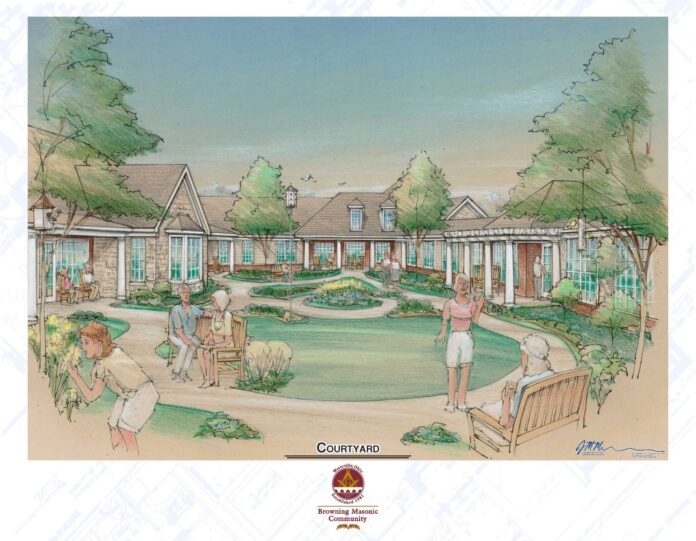Ground was broken last month in Waterville for a new assisted living community for people living with Alzheimer’s.
The $3.7 million facility will be called Pathways at Browning Memory Care Center. Ground was broken May 17, 2012, and construction should begin by mid-June, said David Subleski, president of Browning Masonic Community, a nonprofit retirement and assisted living facility in Waterville.
Browning’s new 20,000-square-foot facility will offer 24 private apartments with private bathrooms.
Various design elements will aid withresident safety and independence, Subleski said.
The bathroom light, for example, is set to go on as soon as a motion sensor detects the resident getting out of bed. The light helps to “cue” memory, prompting the resident to use the bathroom, Subleski said.
Heated bathroom floors make the room feel welcoming even on bare feet, encouraging good hygiene, he said.
“We want people to live as independently as possible and function as well as they can and we’ve incorporated some technologies that help with that,” Subleski said.
The facility will consist of two “neighborhoods” of 12 apartments each, with the two wings connected to allow free movement between. A courtyard in the center of the complex is also enclosed.
“Some people just need to move,” Subleski said. “We wanted to give them places to go where they could be safe.”
The dining area will look, feel and smell like a home kitchen, Subleski said.
“All that is important in terms of stimulating appetite and having conversations,” Subleski said. “We never know where the next connection is going to come from.”
Programming will be available around the clock to cater to each resident’s natural bodily rhythm.
“Not everyone is an 8 to 5 Monday through Friday individual,” Subleski said. “Our trademark program is called Rhythm of the Day. It ties into the natural rhythms we all have. We all have portions of the day we are more physically active and portions we are more mentally active.”
Person-centered care is important with Alzheimer’s patients, said Salli Bollin, executive director of the Alzheimer’s Association, Northwest Ohio Chapter.
“People are not one-size-fits-all. Anything you can do to make theenvironment supportive of the individual is great,” Bollin said. “Routine and structure is really important as well as familiarity.”
Activities will adhere to a Montessori-style philosophy, Subleski said.
“If they are part of a group and see something else that looks interesting, they can decide to do something with that or they can come back and be in the group,” Subleski said. “It allows them to have choice. That’s what this is about.”
The facility will also include two respite rooms available for area caregivers to place their family member for a night or weekend.
“Roughly 40 percent of caregivers pass away before those they are caring for because they neglect their own physical and mental health,” Subleski said. “We wanted to be able to provide resources and support for those out in the community to be able to leave their loved one with us and get the attention they need personally and not feel guilty or worried Mom or Dad are not being properly supported and cared for.”
More than 5.4 million Americans are living with Alzheimer’s disease, including more than 9,000 in Lucas County and 38,000 in Northwest Ohio, Bollin said.
“The numbers are high and unfortunately the numbers are growing, because what we also know is age is the most common risk factor for developing this disease and we have an aging demographic in this country,” Bollin said. “This disease impacts people of all educational levels, all economic situations, all backgrounds. It’s a devastating disease.”
The response to Pathways has been excellent, Subleski said.
“We’ve had enough inquiries already to fill it, but we will wait until closer to the true open date to take applications,” Subleski said. “We know we can’t extend the life of somebody with this disease, but our goal is to try to make that time that remains a better quality of life.”
For more information, visit browningmasoniccommunity.org or www.alz.org or call the Alzheimer’s Association at (800) 242-3900. ✯























